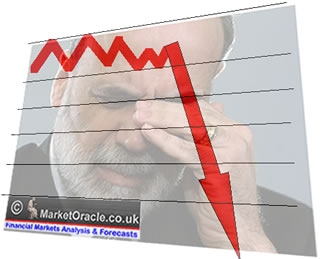Fed Strategy Working, Higher Stock Prices Point to Rising Economic Optimism
Economics / Economic Recovery Oct 17, 2009 - 12:40 PM GMTBy: Bryan_Rich
 If you consider all of the structural problems in the U.S. economy, there has not been a lot of progress toward getting things back on track. The root causes of what created the near debilitating financial and economic crisis still remain:
If you consider all of the structural problems in the U.S. economy, there has not been a lot of progress toward getting things back on track. The root causes of what created the near debilitating financial and economic crisis still remain:
![]() Banks are still saddled with toxic assets,
Banks are still saddled with toxic assets,
![]() Housing prices are still 30 percent lower,
Housing prices are still 30 percent lower,
![]() Foreclosures are still hitting new record levels,
Foreclosures are still hitting new record levels,
![]() Credit is still tight and demand for credit is still contracting sharply,
Credit is still tight and demand for credit is still contracting sharply,
And now …
The budget deficit has ballooned,
And debt levels around the world have climbed.
The U.S. government has thrown trillions of dollars at the problem. And the actions they’ve taken, for the time being, have helped to avoid a collapse of the financial system that would have caused a massive run on banks, a standstill of economic activity and a worldwide economic depression.
There are plenty of areas to question and debate the decisions made by the U.S. Treasury, the Fed and other government types. But the stabilizers and backstops, to this point, have managed to avert an economic freefall. Of course, the ultimate outcome of policy actions has yet to be determined.
But it’s clear that the U.S. and economies around the world remain fragile.
Even so, people are grasping tightly to the idea that a sharp bounce back is in progress and that a return to normalcy is near.
For the Fed, it’s this type of optimism that is driving a perfect operating scenario.
 |
| Government action has averted financial disaster, but global economies remain fragile. |
What Is the Fed’s Perfect Scenario?
If the Federal Reserve and the U.S. Treasury could have scribbled out a wish list for financial market conditions last March when global economies and global markets were in freefall, it might have looked something like this …
Wish #1: Please give us rising stock prices.
Rising stock prices improve the sentiment of investors and consumers. They replenish some lost paper wealth and make companies feel better about the future. It’s amazing what a 64 percent rise in stock prices can do for confidence.
Wish #2: Please give us stable interest rates.
Demand is massively depressed by things like evaporated consumer wealth, tight credit, and high unemployment. And deflation has been, and remains, the immediate problem.
The Fed’s answer: Zero interest rates and “printing money.” These tools are at work to prevent a deflationary spiral and to influence low mortgage rates to curb the housing implosion.
But consumer credit and mortgages are priced based on market-driven interest rates, not rates set by the Fed. So a move higher in market interest rates, like interest on 10-year Treasury notes and Libor, would create a big problem for the Fed. It would drive up interest rates on consumer credit and mortgages, which would create even bigger problems for consumers and for the housing market. But that hasn’t happened.
Wish #3: Please give us stable commodity prices, especially oil.
Crude oil is down 50 percent from its high a year ago. In a period where consumers are more inclined to save, not spend … stable gas prices are critical.
Wish #4: And a gradually declining dollar wouldn’t hurt …
This is the icing on the cake. Even if global demand for everybody’s exports is still in the gutter, the effect of a weaker currency on GDP is a nice kicker. A weaker dollar means we import less and perhaps we export a little bit more … but most importantly, the net value that comes from importing less and exporting a little more is a key positive contribution to GDP.
Despite all of the fear about the future of the dollar, it’s important to realize that a weaker currency is actually good for an economy when economic growth is depressed. Our trade balance is narrowing and our current account balance has diminished dramatically.
Now, when the economy is growing at a healthy rate, then a stronger currency is preferred because it helps improve quality of life.
 |
| A weaker dollar is actually good for a depressed economy because it helps narrow trade and account balances. |
A Gift Without Staying Power
By coincidence, or not, all the Fed’s wishes have come true. And this confluence of gifts from the financial markets has bought some time to address some of the structural economic problems. But the structural problems haven’t been repaired.
Financial markets are rarely compliant to wish lists, especially when the performance defies fundamentals. At some point, the markets will find fundamental equilibrium.
The key question is: When will markets revert to reality?
That’s the hard part.
The U.S. stock market continues to be the gauge of how investors feel about the prospects of a sustainable recovery. Higher stock prices equal more optimism. And more optimism equals higher risk appetite.
But at this stage, the idea of chasing returns that are not supported by fundamentals is a high-risk, low-reward proposition. And it’s not hard to find a reference point of the type of pain that can be associated with the divergence between market prices and fundamentals.
It was only twelve months ago that currencies, commodities and stock markets made sharp and abrupt collapses.
As for the Fed and the Treasury’s wish list … when the rise in stocks ends, so will confidence and any hopes for a sharp economic recovery. And when confidence wanes, investors feel more risk averse.
What Does That Mean for Currencies?
 |
| Fears of the dollar’s demise may be premature when compared to other currencies. |
Despite all of the ugly issues surrounding the U.S. economy, it will have among the smallest of economic contractions in 2009 compared to other G-7 countries, second only to Canada. And for 2010, the U.S. is expected to outperform all other major developed market economies.
That says something about the state of the rest of the world.
And when it comes to the dollar, and currencies in general, you have to respect the relative nature of currency values. Currencies don’t operate in a vacuum.
A country’s currency is never valued based on how well or how poorly its particular economy is doing in isolation. It’s always measured against another country’s currency. So it is always valued based on how a particular economy is doing relative to another economy.
For those that are fearing darker days for the dollar, remember that the least ugly currency can still win the beauty contest. Also, any rise in risk aversion is a positive for the dollar.
Regards,
Bryan
This investment news is brought to you by Money and Markets . Money and Markets is a free daily investment newsletter from Martin D. Weiss and Weiss Research analysts offering the latest investing news and financial insights for the stock market, including tips and advice on investing in gold, energy and oil. Dr. Weiss is a leader in the fields of investing, interest rates, financial safety and economic forecasting. To view archives or subscribe, visit http://www.moneyandmarkets.com .
Money and Markets Archive |
© 2005-2022 http://www.MarketOracle.co.uk - The Market Oracle is a FREE Daily Financial Markets Analysis & Forecasting online publication.



